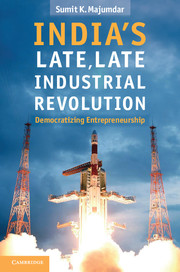Book contents
- Frontmatter
- Contents
- Figures
- Tables
- Acknowledgments
- Preface
- 1 Vent for growth
- 2 Industrial revolutions
- 3 Aspects of Indian enterprise history
- 4 The emergence of modern industry
- 5 Asian late industrialization
- 6 Democratizing entrepreneurship
- 7 Contemporary India
- 8 The services sector debate
- 9 A paean for manufacturing
- 10 Reindustrializing India
- Appendix
- Notes
- Bibliography
- Index
7 - Contemporary India
Published online by Cambridge University Press: 05 June 2012
- Frontmatter
- Contents
- Figures
- Tables
- Acknowledgments
- Preface
- 1 Vent for growth
- 2 Industrial revolutions
- 3 Aspects of Indian enterprise history
- 4 The emergence of modern industry
- 5 Asian late industrialization
- 6 Democratizing entrepreneurship
- 7 Contemporary India
- 8 The services sector debate
- 9 A paean for manufacturing
- 10 Reindustrializing India
- Appendix
- Notes
- Bibliography
- Index
Summary
Contemporary Indian enterprises
The entrepreneurs’ data presented in Chapter 6 suggest that a transformation is under way. Yet, behind the dynamics is the issue of whether this is simply a revival, as a set of reactions to past impoverishments, or genuine regenerations of an industrial spirit that also experiment with new businesses and functionalities so as to make the industrial transformation a genuine revolution. Specific cases and facts address this issue. I posit that the evidence suggests not just a revival but a regeneration.
The older large business houses of India, such as Bangur, Birla, Goenka, Kilachand, Mafatlal, Modi, Sarabhai, and Shriram, are no longer dominant, if they exist at all. One of the largest Indian business groups, Martin Burn, has become extinct, falling prey to Bengalis’ inabilities to be businessmen. In the place of the old names, new names have emerged. A listing of these businesses and names has been made by journalist Harish Damodaran. Among these new businesses, three companies assert Indian-owned firms’ emergence as serious world-stage players. These are: Arcelor-Mittal in steel, Videocon in consumer electronics and white goods, and Bharti Cellular with its Airtel brand in wireless communications.
- Type
- Chapter
- Information
- India's Late, Late Industrial RevolutionDemocratizing Entrepreneurship, pp. 186 - 216Publisher: Cambridge University PressPrint publication year: 2012



